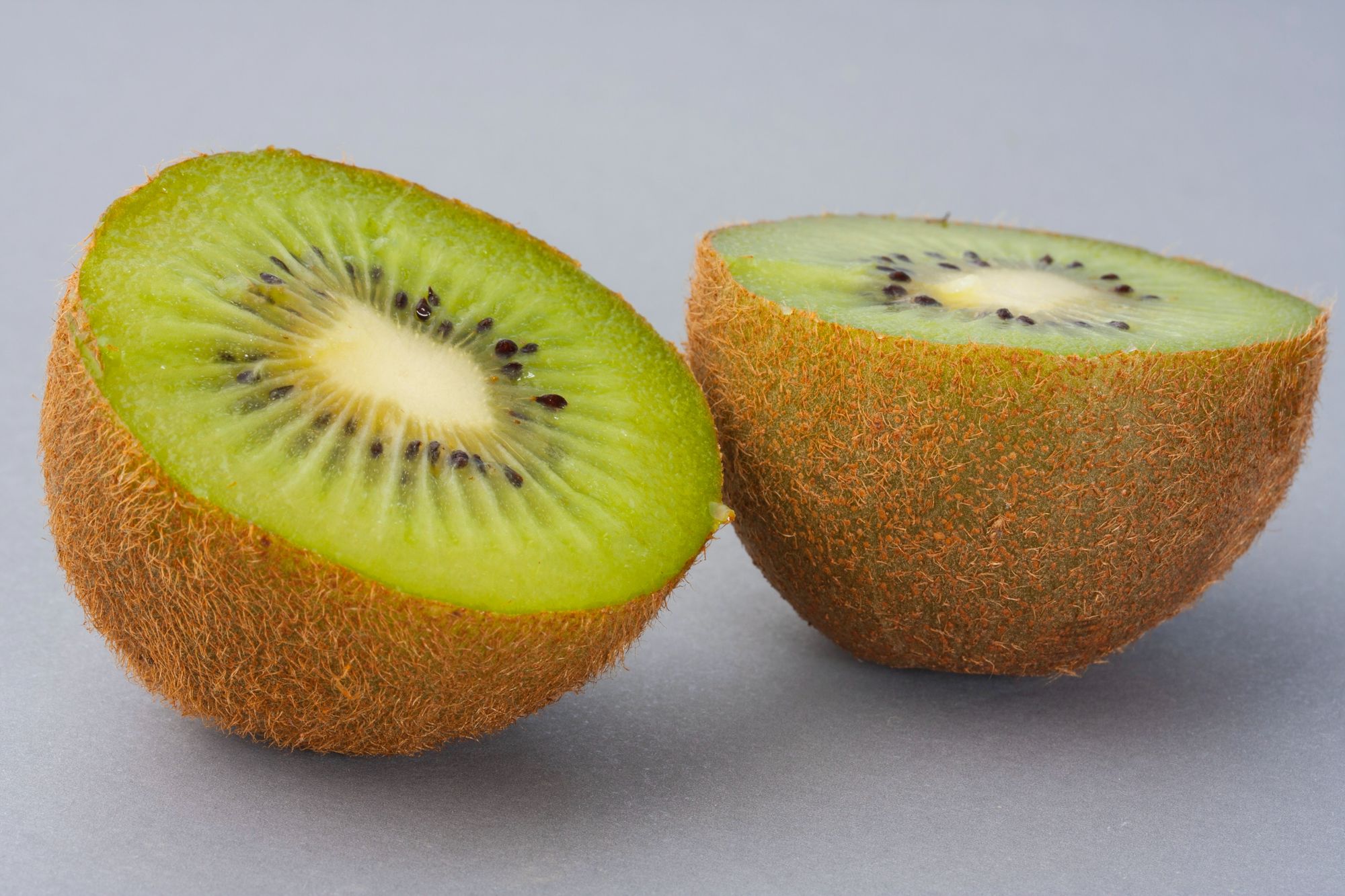When it comes to treating our four-legged companions, it's essential to discern between what's delicious and what's nutritious. Kiwi, a fruit adored by many, often raises eyebrows when pet owners consider offering a slice to their furry pals. Is it a wise choice? Let’s dig in.

Kiwi's Nutritional Profile: What's In It For Dogs?
Kiwis are more than just a tasty treat for humans. They are packed with a host of nutrients, many of which can benefit dogs:
- Vitamins: Kiwi is a vitamin powerhouse, containing vitamins C, K, and E. Particularly, Vitamin C plays a role in collagen synthesis, which is essential for healthy skin, cartilage, and bones.
- Minerals: Rich in potassium, kiwis can support nerve and muscle functions in dogs.
- Antioxidants: The antioxidants in kiwis combat free radicals, potentially boosting the immune system and keeping illnesses at bay.
Potential Pitfalls: Not All Parts of the Kiwi Are Equal
While the fruit's flesh is a nutritional gem, there are parts of the kiwi and considerations that dog owners should be wary of:
- Kiwi Seeds: Though not inherently toxic, it's best to err on the side of caution and remove them. In large quantities, they might disturb a dog's digestive system.
- Allergic Reactions: All dogs are individuals, and just like humans, they can have allergic reactions to new foods. Symptoms to watch out for include itching, swelling, or unusual breathing patterns.
- Texture & Skin: The soft, squishy nature of kiwi might pose a choking risk for some dogs, especially the smaller breeds. The skin, even though nutritious, can be tough to digest for some canines. Peeling the kiwi and serving it in manageable portions is advisable.
How to Safely Serve Kiwi to Your Dog
If you decide to introduce kiwi to your dog's diet, it's essential to do so safely and in moderation:
- Preparation is Key: Start by selecting ripe kiwis. Wash them well to remove any pesticides, peel off the skin, extract the seeds, and slice the fruit into manageable chunks suitable for your dog's size.
- Moderation: Kiwi should be an occasional treat rather than a staple in your dog's diet. Too much of any fruit can lead to digestive issues, so it's best to keep the portions in check.
- Monitor for Reactions: After giving kiwi to your dog, keep an eye out for any adverse reactions or digestive upsets. If your dog seems to be uncomfortable or shows signs of an allergic reaction, it's best to consult with a veterinarian.
Additional Considerations: Beyond the Kiwi Basics
While the benefits and potential concerns associated with kiwi are clear, understanding the broader context of canine nutrition can ensure that our pets enjoy not just kiwi but a variety of fruits safely.
The Digestive System of Dogs: Not Quite Like Ours
Dogs have a shorter digestive tract compared to humans, which means they digest food differently. While we can handle various fruits and vegetables, dogs' systems are primarily designed for meat. That’s why any introduction of fruit, including kiwi, should be cautiously approached. The high fiber content in fruits might lead to loose stools or digestive discomfort if overfed.
Other Fruits to Explore (or Avoid)
While kiwis can be a delightful treat, they are not the only fruit on the block. Many fruits can be safely given to dogs:
- Apples: Packed with vitamins A and C, they're great as long as seeds and core are removed.
- Bananas: High in potassium and can be a sweet treat in moderation.
- Blueberries: An antioxidant-rich snack that's perfect in small amounts.
However, not all fruits are dog-friendly:
- Grapes & Raisins: Highly toxic and can lead to kidney failure.
- Cherries: The pit, stem, and leaves contain cyanide and can be harmful.
- Citrus Fruits: While the flesh might be safe in small amounts, the seeds, peel, leaves, and stem can cause digestive issues.
Hydration and Fruits
Fruits, including kiwi, have high water content. This is great for keeping dogs hydrated, especially during hot days. However, it's important to remember that while fruits can supplement hydration, they shouldn't replace the regular intake of fresh water.
Beyond Kiwi: A Holistic Approach to Canine Nutrition
Diving deeper into the world of canine nutrition, it's evident that while fruits like kiwi can be beneficial, they should only be a part of a broader, balanced diet for our four-legged companions.
Protein: The Cornerstone of a Dog's Diet
At the core of any dog's nutritional needs is protein. Derived primarily from animal sources like beef, chicken, fish, and lamb, proteins supply essential amino acids necessary for tissue repair, muscle development, and overall growth. While fruits provide many micronutrients, they can't replace the protein-centric diet dogs require.
Fats: Essential but in Moderation
Fats, sourced from oils and meats, are another critical component. They support skin health, promote a shiny coat, and are vital for absorbing fat-soluble vitamins like A, D, E, and K. However, just like with humans, excessive fat can lead to obesity and related health issues in dogs. Balance is key.
Carbohydrates: Necessary but Choose Wisely
While dogs don't necessarily need carbohydrates, they do provide a source of quick energy. When choosing carbs for your dog, opt for whole grains like brown rice or oats and avoid fillers that offer no nutritional value.
Micronutrients: The Small Giants in Nutrition
This is where fruits, including kiwi, play a role. They're rich in vitamins and minerals that support various bodily functions. For example, vitamin C from fruits supports the immune system, and potassium helps muscle function. But remember, these should complement, not replace, the primary components of their diet.
Supplements: Are They Needed?
Given the right diet, most dogs don't need supplements. However, in certain cases, such as specific health conditions or age-related issues, supplements like glucosamine or omega-3 fatty acids can be beneficial. Always consult a vet before introducing any supplements.
Treats: The Icing on the Cake
Just as we relish an occasional treat, so do our furry pals. Whether it's a slice of kiwi, a dog biscuit, or a special chew toy, treats bring joy. But they should be given sparingly, making up no more than 10% of a dog's daily caloric intake.
Integrating New Foods: A Step-by-Step Guide
As pet owners, our curiosity often propels us to explore diverse food options, be it kiwi or other unconventional choices. But how do we ensure a seamless integration of these new foods into their diets without upsetting their systems? Here's a practical guide.
Step 1: Do Your Homework
Before introducing any new food, research is paramount. As we've seen with kiwi, while it offers various benefits, it's not without its concerns. The same applies to any other food. Look into its nutritional profile, benefits, potential risks, and recommended serving size for dogs.

Step 2: Start Small
Begin by offering a tiny amount of the new food. This is particularly important to gauge your dog's reaction, both in terms of taste preference and potential allergic reactions. If it's a fruit, ensure it's appropriately prepared – seeds removed, washed, and peeled if necessary.
Step 3: Monitor Closely
After the initial introduction, observe your dog for a few hours. Look out for any signs of discomfort, allergies, or digestive upsets. Symptoms might include itching, diarrhea, vomiting, or unusual lethargy.
Step 4: Gradual Integration
If the initial test goes well, consider integrating the new food into their diet slowly. This might be over a week or even two, increasing the quantity bit by bit, ensuring there's no adverse reaction at each stage.
Step 5: Variety is the Spice of Life
It's great to have a new food option that your dog loves and benefits from, but remember to keep their diet varied. Relying too heavily on one food source can deny them the wide range of nutrients they require.
Step 6: Regular Vet Consultations
Always keep your vet in the loop about any significant dietary changes. They can provide insights, warn of potential risks, and offer guidance tailored to your dog's specific needs.
Beware of the Fad Diets
Just as with human nutrition, fad diets come and go in the pet world. Grain-free, raw, vegan – the list is endless. While some might have merits, it's crucial to approach them with caution. What works for one dog might not work for another. Above all, any drastic dietary shift should be discussed with and monitored by a veterinarian.
The Ultimate Goal: Holistic Health
In the end, our journey into exploring foods like kiwi for our pets stems from our desire to see them thrive. Nutrition is a critical pillar of their well-being, but it's just one aspect. Mental stimulation, physical activity, routine health checks, and, of course, quality time with their favorite human all contribute to their overall happiness and health. Let's ensure that every slice of kiwi, every new food, and every decision we make aligns with our ultimate goal – a holistic, happy life for our beloved furry family members.
Common Misconceptions in Canine Nutrition
As we venture further into the realm of canine nutrition, it's pivotal to address and debunk some of the common myths and misconceptions that have become prevalent. Setting the record straight can aid us in making more informed choices for our pets.
Myth 1: Dogs are Carnivores and Shouldn't Eat Fruits or Vegetables
Truth: While dogs have carnivorous tendencies and their ancestral diet was primarily meat-based, they are, in fact, omnivores. Over time, especially through domestication, dogs have developed the ability to digest certain plants and fruits, including kiwi. Many fruits and veggies offer valuable nutrients that can be beneficial when included in moderation.

Myth 2: All Human Foods are Bad for Dogs
Truth: Not all human foods are harmful to dogs. While some foods, like chocolate, grapes, and onions, are toxic to canines, many others can be beneficial and even health-boosting when given in the right amounts. For instance, plain cooked chicken, rice, and certain fruits like kiwi or blueberries can be excellent treats or meal additions.
Myth 3: Commercial Dog Food Contains All the Nutrients a Dog Needs
Truth: While many high-quality commercial dog foods are formulated to be nutritionally complete, this doesn't mean that supplementing with fresh foods is unnecessary. Fresh foods can provide live enzymes, varied textures, and unique nutrients that might not be as prevalent in kibble or canned food.
Myth 4: Raw Diets are the Healthiest Option for All Dogs
Truth: While raw diets can be beneficial for some dogs, they are not a one-size-fits-all solution. They require careful planning and preparation to ensure they're balanced. Additionally, some dogs might not handle raw food well, leading to digestive upsets or potential bacterial infections.
Myth 5: Dogs Should Eat the Same Thing Every Day
Truth: Just as humans thrive on a varied diet, dogs can also benefit from dietary diversity. Rotating protein sources, introducing safe fruits and vegetables, and occasionally changing up their diet can expose them to a wider range of nutrients and flavors.
Continuous Learning: The Path Forward
Nutrition, whether for humans or dogs, is a constantly evolving field with new research emerging regularly. What’s deemed a best practice today might be replaced by a new understanding tomorrow. As responsible pet owners, it's our job to stay informed, question the status quo, and always prioritize the well-being of our furry companions.
And it's not just about the food they eat. Their environment, the amount of exercise they get, their mental stimulation, and the love and care they receive from us all play crucial roles in their overall health.
Embracing the Journey
Being a pet parent is a journey filled with joys, challenges, learning curves, and memorable moments. Whether it's finding out about the benefits of kiwi or understanding the intricacies of canine nutrition, each step we take is a testament to the love and commitment we have for our pets. And in return, we get the unwavering affection and loyalty of our four-legged friends. So, here's to more discoveries, more tail wags, and a life filled with pawsitivity!
Conclusion:
In our exploration of canine nutrition, we've uncovered that while kiwi can be a nutritious treat for dogs, it must be introduced mindfully. Beyond kiwi, a dog's diet should be protein-centric, balanced with fats, carbohydrates, and micronutrients. Not all human foods are harmful; in fact, many can supplement their diet beneficially.
However, it's vital to debunk misconceptions, like the exclusivity of raw diets or the strict carnivorous label for dogs. As pet owners, continuous learning is our path forward. By embracing dietary diversity, regular vet consultations, and always prioritizing our pet's well-being, we ensure a happy, healthy life for our furry companions.
Frequently Asked Questions (FAQs)
1. Can dogs eat kiwi fruit safely?
Yes, dogs can eat kiwi safely in moderation. Kiwi is rich in vitamins, minerals, and antioxidants beneficial for dogs. However, always introduce any new food, including kiwi, slowly and monitor for any allergic reactions or digestive issues.
2. How should I prepare kiwi for my dog?
Before serving kiwi to your dog, peel off the skin and remove any seeds. Offer the fruit in small slices or bite-sized pieces to prevent choking and ensure easy digestion.
3. Are there any risks associated with feeding kiwi to dogs?
While kiwi itself is non-toxic, overfeeding can cause digestive upsets like diarrhea or loose stools. Also, ensure your dog doesn't consume the skin or seeds, as they can pose a choking hazard or cause digestive issues.
4. How much kiwi can I give my dog?
Start with a small slice or piece to see if your dog likes it and tolerates it well. If there are no adverse reactions, you can give kiwi as an occasional treat, ensuring it doesn't make up more than 10% of their daily caloric intake.
5. Apart from kiwi, what other fruits are safe for dogs?
Many fruits, like apples (without seeds), bananas, and blueberries, are safe for dogs. However, always avoid grapes, raisins, and cherries, as these can be toxic to canines.
6. What nutritional benefits does kiwi offer to dogs?
Kiwi is packed with vitamin C, vitamin K, vitamin E, and potassium. These nutrients support the immune system, ensure healthy skin and coat, and aid in muscle function.
7. Do all dogs react the same way to kiwi?
No, every dog is unique. While many dogs might enjoy and benefit from kiwi, some might be allergic or simply dislike the taste. Always monitor your pet after introducing any new food.
8. Is commercial dog food enough for my dog's nutrition?
While many high-quality commercial dog foods are nutritionally complete, fresh foods, like kiwi, can offer live enzymes and unique nutrients. However, always ensure any additions to their diet are safe and given in appropriate amounts.
9. Should I consult my vet before giving kiwi to my dog?
It's always a good idea to discuss any significant dietary changes or introductions with your veterinarian. They can provide guidance tailored to your dog's specific needs.
10. Are there any general guidelines for introducing new foods to dogs?
Yes, always introduce new foods gradually and in small amounts. Monitor for any reactions or changes in behavior and digestion. If unsure, consult with a veterinarian for guidance.




